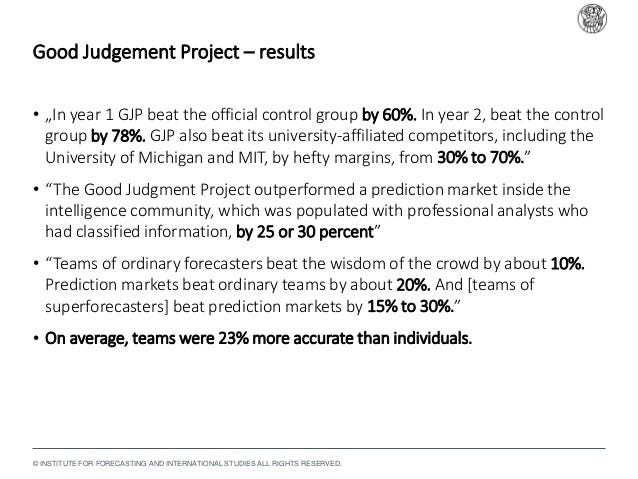“There is no harm in being wrong, especially if one is promptly found out.” - John Maynard Keynes
Whether designing policy, investing in companies, predicting a global pandemic or planning a holiday, we would all benefit from being able to make more accurate forecasts of future events.
In a landmark 2005 study, Wharton professor Philip Tetlock famously demonstrated that the predictions of most self-proclaimed experts were no more accurate than a monkey throwing darts.
What is more interesting is that Tetlock went on to study the reasons behind this, and eventually devised a system powered entirely by volunteers that drastically improved on any previous attempts at forecasting the future in human history.
Despite lacking professional accreditation or “expertise”, the participants in the Good Judgement Project have beaten all other benchmarks, competitors, and prediction markets. They have even beaten the collective judgment of CIA intelligence analysts with access to classified information. And they have beaten them all by significant margins.

At the centre of Tetlock’s crowd-based prediction system are individuals known as Superforecasters. These individuals are most easily defined not by background, profession or education, but by the way in which they live, think and approach problem solving. On average, their predictions are right about 40% more often than the mean.
The behaviour of Superforecasters provides us with simple, valuable, learnable lessons for how to think better. They are useful not just to investors, but to anyone interested in getting closer to the truth. Or, put another way, anyone interested in being right. 😛
How to become a Superforecaster
Philosophy
Cautious:
Nothing in the world is certain. Approach everything with scepticism.Humble:
The universe and all that happens within it is infinitely complex. You are a small part of a much bigger system, and should be respectful of the fact that you know little and are most often wrong.Nondeterministic:
Whatever happens is not meant to be and does not have to happen.
Fate / the hand of God is reassuring, but will not help you make good decisions.
Therefore, everything should be measured in terms of probabilities.
Skills and mindset:
Actively open-minded:
Beliefs are hypotheses to be tested, not defended. You should be willing to update them frequently on the basis of new information. People are awful at this. Get good at it, and you have a massive advantage.Intelligent and knowledgeable, with a “need for cognition”:
Be intellectually curious, engage frequently in puzzles and mental challenges.Reflective:
Be introspective, be self-critical, aim to improve.Numerate:
Get comfortable with numbers and thinking about decision-making mathematically (rather than intuitively, as humans are wont to do).
Approach to judging future outcomes:
Pragmatic:
Do not wed yourself to a previously held supposition or agenda.
This will blind you to the truth.Analytical:
Step away from what immediately and intuitively “feels” right. Question assumptions, and assess the situation by considering all alternative possibilities.Many-minded
Look at the views of others, especially if they differ from your own. Value them objectively, and if they seem to have strengths, then absorb them into your own views.Probabilistic:
Judge the world and decisions in many shades of maybe. Put everything on a scale from 0% to 100% in terms of certainty, and be as granular as possible in your judgement. Are you 70% sure, or 73% sure?Thoughtful updater:
When facts change, change your mind. Usually, you should update your probability judgement for a specific outcome incrementally (eg. from 73% to 68%). Sometimes you will need to change it drastically (eg. from 73% to 35%), even if this means destroying long-held beliefs that are core to your pride and sense of self. This can be painful and embarrassing. Even very smart people are bad at doing it as a result.Good intuitive psychologist:
Remain constantly aware of the value of checking your own thinking for cognitive and emotional biases. We are all plagued by them thanks to our biology.
Work ethic:
Growth mindset:
Believe it’s possible to get better. If you take the position “I’m not good at X”, it is not going to help you get any better at X. You will remain rubbish.Grit:
Be determined and stick at things, however long it takes.
These rules seem like obvious platitudes, but the fact that the CIA’s top intelligence analysts are worse at predicting the future than a bunch of “average" Joes and Janes shows that we can all improve.
Check out Philip Tetlock’s book Superforecasting, to really dig into this subject.




Perhaps experts are sometimes to learned in their area to spot simple trends - the same as how another person reviewing a piece of work you have written is able to spot mistakes that you couldn't see. Tetlock's group was also probably able to be more accurate as a result of the variety of the people involved, and we can see even in the recruitment of graduates nowadays that many companies are looking to recruit from many different backgrounds, who approach problems from different perspectives, rather than sticking to 'tried-and-tested' methods.